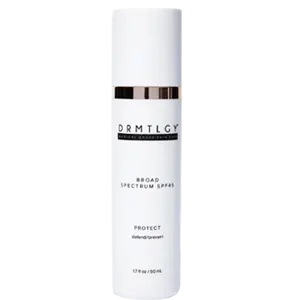Sunscreens: Your Key to Healthy Skin
Most people recognize the importance of sunscreens during the summer months, but did you know that you should be applying this product all-year round? Find out why.

Dermatologists recommend the best sunscreens for acne-prone skin, dry skin, & sensitive skin. Shutterstock Images
What are Sunscreens?
A sunscreen, otherwise called a sunblock, is a skincare product that helps protect the skin against frequent and prolonged sun exposure. It is a topical product that comes in various forms, with the most common being the lotion, gel, and spray forms. The use of this product is encouraged by reputable medical organizations such as the American Cancer Society and the American Academy of Dermatology.
There are two main types of sunscreens, classified according to their composition[1]:
- 1) physical sunscreens (a.k.a. mineral sunscreens)
- 2) chemical sunscreens.
Physical sunscreens[2] consist of titanium dioxide[3] and zinc oxide[4]. They work like a shield that sits on the surface of the skin, physically blocking and deflecting the UV rays from the sun.
Chemical sunscreens, on the other hand, is like a sponge that absorbs UV rays. Unlike physical sunscreens, they don't leave a white residue and are much easier to rub onto the skin. Among the most popular chemical sunscreens are avobenzone[5] and octisalate[6].
Highly Recommended
![DRMTLGY Broad Spectrum SPF 45]()
Best Sunscreen
DRMTLGY Broad Spectrum SPF 45 is a powerful sunscreen that protects your skin from UV rays, helps reduce signs of age, and soothes redness from sun damage.
You can BUY it directly from the Official Website
Important Reasons You Should Always Wear Sunscreen
Sunscreens are used to protect the skin against the harmful rays of the sun and prevent the development of skin cancer. It is recommended for everyone, regardless of age. It must be applied everytime you go out, all-year round. That's because the sun always emits UV rays even on dark, cloudy days.
Key Ingredients to Look for in Sunscreens
Sunscreens contain ingredients that works by blocking or absorbing UV rays, thus preventing them from reaching and causing damage to the skin. Of the many compounds incorporated in sunscreen products, there are only two which are Generally Recognized as Safe and Effective. They are:
Titanium Dioxide - This inert earth mineral is one of the most commonly used ingredients in the cosmetics and skincare industry[7]. Its light-scattering properties effectively protects the skin against UV rays without causing any form of irritation on the skin. Because of its gentleness, it is often recommended for sensitive skin.
Zinc Oxide - Another active ingredient that physically blocks UV light, but with the added benefit of not being easily decomposed by sunlight. Because of that, it tends to stay on the skin longer. And just like titanium dioxide, zinc oxide is also gentle and non-irritating one the skin.
Do Sunscreens Really Work?
Sunscreens are proven to provide effective protection from harmful UV rays, especially in fair-skinned individuals. When used the right way, they can reduce the risk of skin cancers (i.e. squamous cell carcinoma, melanoma) by up to 40-50%. They may also help fade away sun-induced signs of aging such as age spots, wrinkles, and sagging skin.
To get the most out of your sunscreen, it is advised to apply it about 15 minutes before going outdoors then reapply every two hours or as frequently as needed.
How to Choose the Best Sunscreens?
In general, sunscreens that provide the best protection are those which have an SPF of at least 30. When it comes to skin types, however, sensitive skin may be more suitable to products which contain physical sunscreens instead of chemical sunscreens, as the former have been found to be less irritating.
Other desirable characteristics of a good sunscreen include being water-resistant and broad-spectrum. Water-resistant sunscreens are recommended if you're going to get wet or sweat a lot, while broad-spectrum sunscreens offer protection against both UVA and UVB.
Final Thoughts
The use of sunscreens may be an important part of your strategy to shield the skin against the harmful effects of the sun, but you shouldn't always rely on it alone.
Other ways to protect the skin include staying away from the sun as much as possible and using protective clothing, hats, UV- blocking sunglasses, etc.
References
We review published medical research in respected scientific journals to arrive at our conclusions about a product or health topic. This ensures the highest standard of scientific accuracy.
**This is a subjective assessment based on the strength of the available informations and our estimation of efficacy.
*Result may vary. The information contained in this website is provided for general informational purpose. No medical claims are implied in this content, and the information herein is not intended to be used for self diagnosis or self treatment of any condition.
*Disclosure of Material connection: Some of the links in the post above are "associate sales links." This means if you can click on the link and purchase an item, we will receive a commission. Regardless, we only recommend products or services which we use personally and/or believe will add value to our readers. We are disclosing this in accordance with the Federal Trade Commission's 16 CFR, Part 255: "Guides Concerning the Use of Endorsements and Testimonials."





